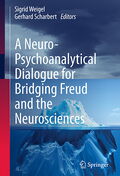Freud and Neurosciences. Investigating the Dialogue between Psychoanalysis and Neurosciences
Programm
An International Symposium at the Center for Literary and Cultural Research Berlin
Conference Language: English
Psychoanalysis and
Neurosciences, two disciplines which, since Freud’s lifetime, have kept
themselves to themselves, started a shy dialogue again in the 1990s.
This recent approach takes place agaist the following background: On the
one hand, psychological phenomena are conceptualized as effects of
physiological processes, therefore research focuses on neurological or
biochemical indicators. On the other hand, psychological phenomena are
observable and interpretable in behaviour, expressions and symptoms
which indicates research of an analytical kind. Transitions and
interactions between the two apporaches, however, have not yet been
observed often.
Advances in brain-imaging enabled us to describe
the brainanatomical and physiological complexities of illnesses and to
correlate specific groups of neurons with cognitive and sensual
abilities. However, investigations concerning the interferences between
neurobiology and biographical experiences can be only brought forward by
a joint effort. Investigations now need to focus on the neurological
basis of psychoanalysis as well as on the psychological terms of
neurology. Because Freud invented not only an innovative theory and
method to explore individual psychological processes, but also a complex
theory of culture and subjectivity, there is an additional need for
research from the perspective of cultural studies. Thus, psychological
processes should be investigatged in cooperation between
psychoanalytical, neurological and cultural research. Where those
disciplines meet we can find a real trading zone between experimental
und analytical methods.
The contemporary way of looking at this
problem finds its opposite in a historical constellation which can be
seen as complementary: At the end of the 19th century we find the
invention of psychoanalysis by the neurologist Freud, which resulted
from the impossibility to localize psychological processes in
physiology; more recently, we find the reinvention of psychoanalysis by
neurobiology, which is, thanks to the advancements in recording
techniques, able to observe and localize physio-neurological processes,
but is not able to understand the language of the psyche.
If the
different methodological approaches and different kinds of knowledge are
accepted in their singularity and seen not only as a challenge but also
as a complement, an epistemological and methodological dialogue has a
chance to develop new neuro-psychoanalytical knowledge.
Friday, 29 October, 2010
14.00
Conference Opening: Sigrid Weigel (ZfL)
Psychoanalysis and Neurosciences I
14.30–15.15
Opening Lecture
Marianne
Leuzinger-Bohleber (Frankfurt a.M.): Enactments in Transference:
Embodiment, Trauma and Depression. What Psychoanalysis Has to Offer to
Neurosciences
15.45–17.15
François Ansermet/Pierre
Magistretti (Geneva/Lausanne): Neuronal Plasticity, Homeostasis and
Somatic States as Key Elements for a Dialogue Between Neuroscience and
Psychoanalysis
Edith Seifert (Berlin): "Die medulla oblongata ist
ein sehr schönes und ernsthaftes Objekt." A Comparison of
Neuroscientific and Psychoanalytical Theories
Interdisciplinary Dream Research
17.45
Heinrich Deserno (Frankfurt a. M./Berlin): Interdisciplinary Perspectives of Dream Research and Dream Interpretation
Tamara Fischmann (Frankfurt a. M.): Dreams, Unconscious Fantasies and Epigenetics
19.30
Key Note Lecture
Mark Solms (Cape Town): What Dreams Are Made Of
Saturday, 30 October, 2010
Psychoanalysis and Neurosciences II
10.00–11.30
Gérard
Pommier (Paris): Importance of the Affects to Understand the
Relationship between the Psychoanalytical and the Neuroscientific Point
of View
Giselher Guttmann (Vienna): Neurobiology of Conscious and Unconscious Control Mechanisms
12.00–12.45
Yoram Yovell (Haifa): Drive and Love: Revisiting Freud's Drive Theory
History of Science
14.00–15.30
Ohad Parnes (ZfL): Between Neuro-Psycho-Analysis and Psycho-Neuro-Immunology: Psychology and Somatic Disease since Freud
Gerhard Scharbert (ZfL): Signs and Souls – French Psychiatry in the 19th Century and the Emergence of Psychodynamics
Epistemology, Culture and Subjectivity: "Mind the Gap"
16.00–18.15
Ulrike Kadi (Vienna): Couch Potato: Some Remarks Concerning the Body of Psychoanalysis
Christine Kirchhoff (ZfL): Serving Various Masters: How Culture Shapes the Apparatus
Georg
Northoff (Toronto): How Can the Infant Called Neuropsychoanalysis Grow
into a Mature Adult? Conceptual and Empirical Considerations
Finissage

